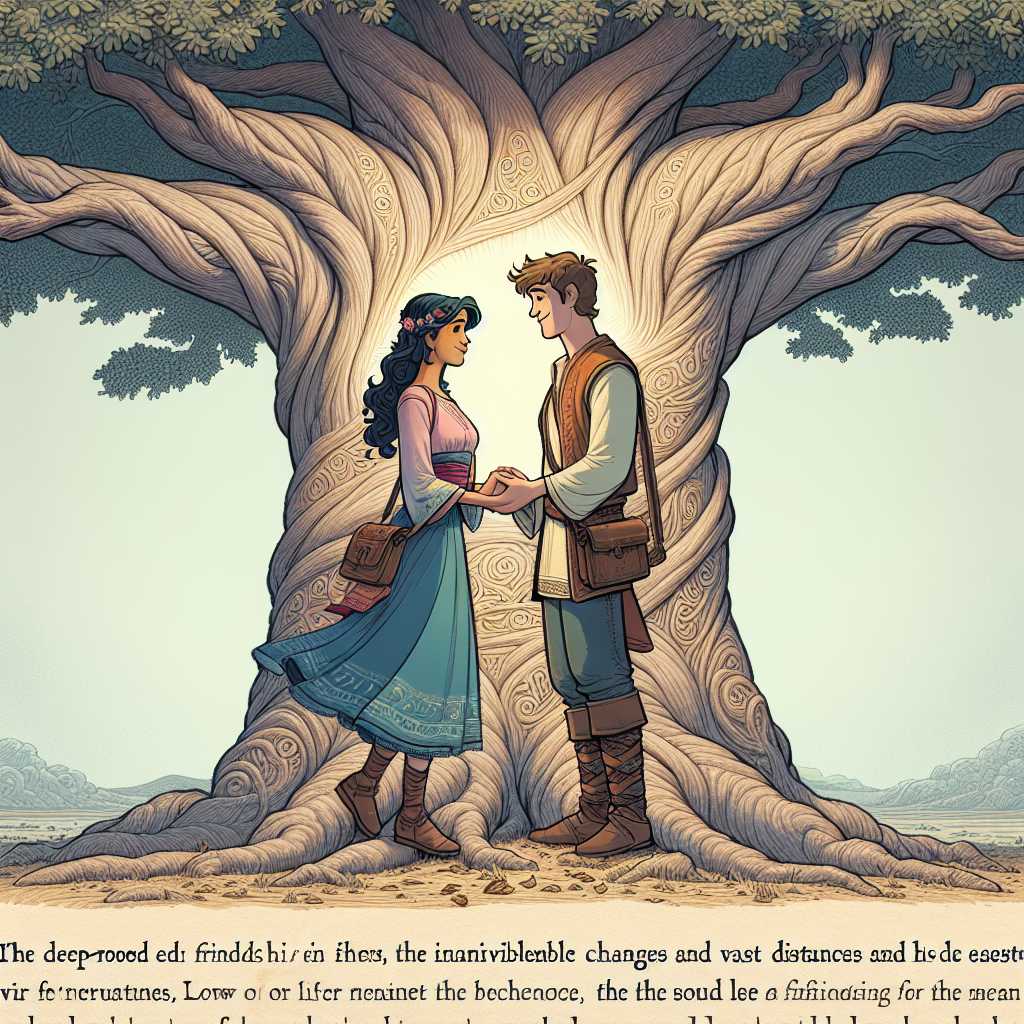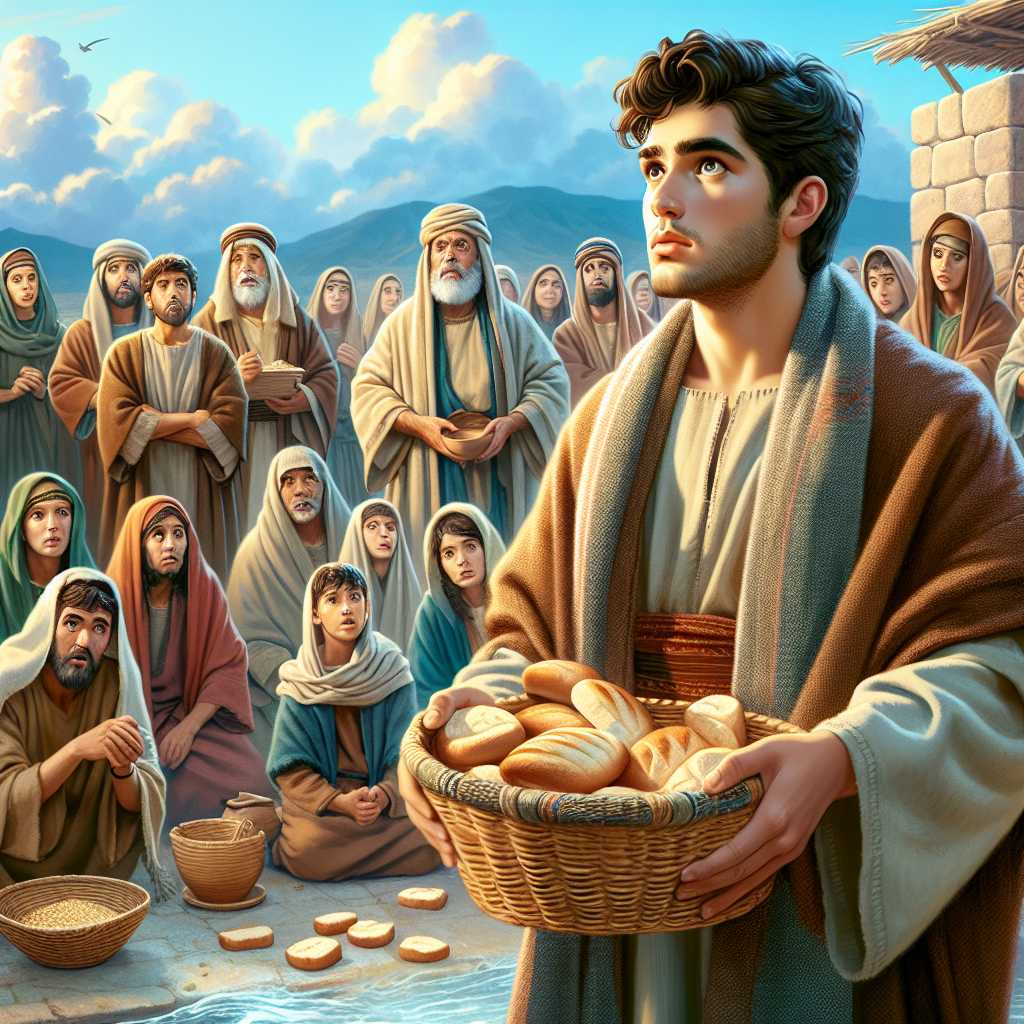
Once, in a village that lay nestled beside an unfriendly mountain, there lived a man whose heart bore a lifelong burden of sorrow. His name was Gregor, and he was a woodcarver—a trade taught to him by his father, and his father’s father before him. His hands, though roughated by years of toil, were gentle to the touch as he shaped wood into objects of awe.
In the quiet of his workshop, beneath a thatched roof that creaked with the breeze, he would coax furniture, figurines, and toys from timber. Yet his true masterpiece, destined for a heartwrapped in darkness, had never been seen by another's eyes.
He was known to the villagers as a quiet spirit, a presence that lingered at the edges, much like an ethereal shadow. **Gregor's own heart was no stranger to shadow**. For years, his home had been filled with the laughter of his beloved wife, Marit, and their daughter, Anka. But a cruel winter several years past had taken them from him, leaving his world devoid of light and melody.
Evenings now found Gregor in solitude, beneath the pale flicker of candlelight, orchestrating an endless symphony of chisel and mallet on wood. And here lay his heart—**in a marionette of exceptional artistry**, crafted by his own hand over many years. It was the likeness of his daughter, Anka, her eyes forever sparkling with the spirit she had embodied in life.
Often, Gregor wondered if the marionette held some piece of Anka’s essence or if he was merely a fool chasing shadows of a past that refused to let go. It was a question that haunted his dreams and whispered through the silence of his days. He spoke to the marionette as he worked, weaving stories of wonder and magic, of kings and queens, hoping, perhaps, that somewhere among the wood and strings, Anka might hear him.
The villagers, aware of his grief, respected the veil of solitude from which Gregor rarely emerged. Yet there was one soul, a young girl named Emilie, who possessed curiosity courts the tender-hearted. She would often wander to Gregor’s workshop, watching from a distance, content with silence and the musical rhythm of his work.
One evening, as the crimson sun retreated behind the mountains, Emilie dared to speak. "Why do you never come to the market, Master Gregor?" she inquired softly. "There’s music and laughter there."
Gregor paused, lifting his gaze from the marionette, not answering directly. "The wood speaks here more than voices and laughter could," he replied, his voice as gentle and weary as the evening light.
But Emilie, with the innocuous persistence of the young, asked the question that had plagued her thoughts, "Do you dance with her?"
Gregor's hand trembled slightly, the words striking a tender chord. "I do," he whispered, almost to himself. "In memory, if not in step."
Silence draped between them, comfortable yet laden with shared understanding of loss. Emilie observed him through thoughtful eyes, intuitively understanding that his soul's rhythm danced through the marionette more easily than through his feet.
Time coursed onward, and the seasons unfurled their pageantry of colors until another winter crept into the village with icy fingers that stole breath and warmth. Gregor kept to his workshop, undisturbed, his vigils prolonged and pensive, the marionette nearly complete. **Anka's visage**, with lips poised to sing and eyes alive with mirth, was perfect.
It was then, during the longest night of winter, when Gregor's heart questioned if its ache might be relieved to some extent by sharing his labor of love. He resolved to show his creation to the villagers—perhaps they could find joy in Anka’s memory as well.
**On a clear morning, amid a sky sewn with frost,** Gregor stepped out of solitude and into the market square with the marionette poised delicately in his arms. Emilie stood beside him, her presence a steadfast source of encouragement.
The villagers gathered tentatively, their curiosity piqued by the rare appearance of the woodcarver whose life had been stitched to sorrow and seclusion. With a tender grace, Gregor set the marionette on a small stage, her strings held in his capable hands. As the marionette danced to the song of his soul, a hush fell over the crowd.
**In that moment, Anka was alive**. She spun and twirled, her wooden body imbued with the essence of a child lost but not forgotten. Gasps of delight escaped the onlookers, their hearts touched by the pure simplicity of the marionette’s grace.
Yet Gregor, with his heart wide open, felt the bittersweet tender yet unbearable truth: Anka’s dance was now only a memory etched in others’ hearts. And though she danced evermore through string and timber, it was no match for the warmth of her laugh, the sparkle of her eye, or the pulse of her true heart.
With resolute tenderness, Gregor felt the old ache within him cease, not with joy, but with acceptance. The marionette, held aloft by strings that once connected his heart to memory, recognized its release, and with it, a part of Anka whispered into the wind, freed at last.
The villagers watched as Gregor lowered the marionette, his world resettled into silence. Emilie stood close by, her young presence a promise that love, remembered and shared, remains resilient against even time's cruelest grasp.
The tale of Gregor, the woodcarver, gained life in the village, a reminder that even the most exquisitely crafted marionettes cannot replace the living dance of those we love. **Though shadowed by loss**, Gregor found solace in knowing that love, in all its forms, endures and holds us even as we learn to let go.










